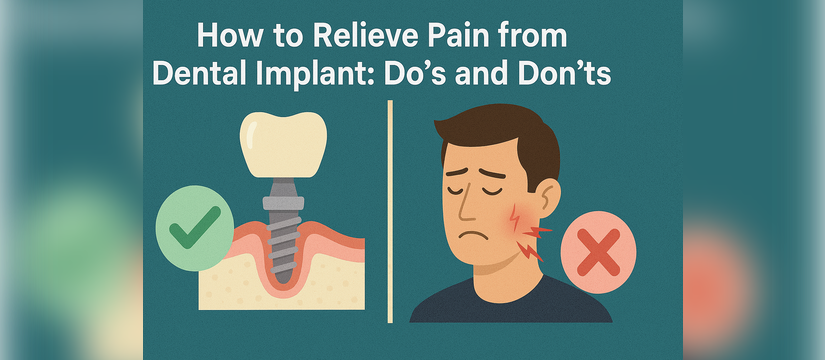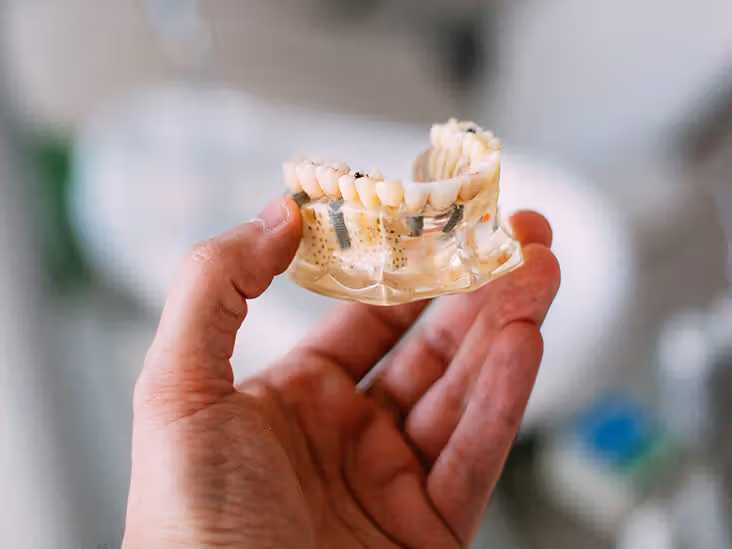
Getting a dental implant is a big step toward restoring both comfort and confidence. But the days right after the procedure can come with soreness that might leave you wondering what’s normal and what’s not. The good news is that post-implant discomfort is common, manageable, and often temporary.
If you’re looking for help with Rockville Dental Implants, this guide offers helpful guidance and caring support through your recovery.
What Causes Pain After a Dental Implant Procedure?
The body needs time to respond and heal after implant placement. Some swelling, tenderness, and sensitivity are expected. This response can happen as your bone integrates with the titanium post, a process known as osseointegration. Pain can also come from minor tissue irritation, pressure, or tightness around the implant site.
How Long Does Dental Implant Pain Last?
Discomfort often begins to fade after the first 72 hours. For many patients, the most noticeable soreness improves by day three to five. Some might still feel pressure or light pain during chewing or brushing in the first week. Persistent, sharp, or worsening pain may signal infection or other concerns that should be checked immediately.
Do’s: Tips for Easing Discomfort and Supporting Healing
Apply Cold Compresses in the First 24 Hours
- Use a wrapped cold pack on your cheek in short intervals.
- Helps reduce swelling and numb the area gently.
- Focus on 15 minutes on and 15 minutes off during the first day.
Stick to Soft, Cool Foods for a Few Days
- Yogurt, smoothies, mashed potatoes, and broth-based soups are safe.
- Avoid hot or spicy dishes, which may irritate the surgical site.
- Chew on the opposite side of your mouth to avoid pressure on the implant.
Take Prescribed or Over-the-Counter Pain Relievers
- Follow the dosage recommended by your dental provider.
- Over-the-counter medications like ibuprofen can reduce inflammation and discomfort.
- Stay consistent with timing to avoid sudden flare-ups of pain.
Maintain Good Oral Hygiene
- Use a soft-bristled brush to clean around the implant area without scrubbing harshly.
- Rinse gently with salt water or a prescribed mouthwash after eating.
- Keep the area clean to prevent infection, which can lead to additional soreness.
Rest and Avoid Heavy Activity
- Give your body a break from intense movement for a few days.
- Sleep with your head slightly elevated to reduce swelling.
- Let the implant settle into the healing process without added strain.
If you’re looking for a Dentist in Rockville MD, having one that closely monitors your healing journey helps ease concerns quickly and safely.
 Don’ts: What to Avoid During Dental Implant Recovery
Don’ts: What to Avoid During Dental Implant Recovery
Don’t Smoke or Vape
- Tobacco can slow healing and increase the risk of implant failure.
- Chemicals in smoke can dry out tissues and delay bone integration.
Avoid Using Straws or Creating Suction
- Suction can disturb the healing blood clot.
- Stick to sipping from cups to keep the surgical area protected.
Don’t Poke or Press the Implant Site
- Avoid touching the implant with your tongue or fingers.
- Pressure can interfere with healing or cause the implant to shift.
Skip Hard, Crunchy, or Sticky Foods
- Popcorn, chips, candy, and nuts can damage the implant or get lodged in sensitive areas.
- Give your mouth time to regain full chewing function before returning to normal diets.
Don’t Ignore Lingering or Increasing Pain
- Persistent discomfort may indicate infection or nerve irritation.
- Contact the dental office if the pain sharpens after a few days.
Understanding Normal vs. Concerning Pain
It helps to know the difference between manageable post-procedure pain and something more serious. Typical signs of dental implant pain include a dull ache, slight jaw pressure, or gum tenderness. These symptoms usually improve day by day.
Red flags include:
- Throbbing pain that worsens instead of easing
- Gum swelling that continues past a week
- Pus, bleeding, or signs of fever
- Numbness or tingling that doesn’t fade
If any of these occur, professional evaluation is important. Catching issues early can protect the implant and your overall health.
Home Remedies That May Help Support Recovery
- Rinse with warm salt water two to three times a day
- Keep a consistent sleep schedule for full-body healing
- Stay hydrated to support circulation and soft tissue repair
- Limit caffeine and alcohol, which can dry out oral tissues
Practicing these supportive steps can lessen pain after dental implant placement and encourage quicker healing.
When to Contact the Dentist
Call your dental provider if:
- Pain spikes after the initial few days
- You notice unusual discharge or swelling
- You accidentally bump or bite the implant area
Regular follow-up visits allow the dentist to track bone healing and spot concerns before they grow more serious.
Final Thoughts
No one wants to deal with discomfort after a procedure, and we’re here to help patients feel safe, informed, and cared for every step of the way. With thoughtful steps, gentle routines, and guidance from our trusted team, pain becomes manageable and healing stays on track.
Trust in your body’s natural recovery and remember that every patient heals at their own pace. Some tenderness is a normal part of the process, but it shouldn’t interfere with daily life.
We invite you to contact us at Rockville Dental to talk through your recovery or schedule a visit. Let’s work together to make sure your smile stays healthy and strong.

